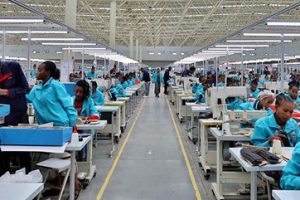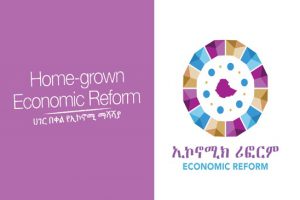
The government has been striving and taking myriads of measures to bring structural reform and ensure sustainable development. However, while observing the achievements gained, it is far from the targeted goals, Fitsum Assefa (PhD), commissioner of the National Planning Commission of Ethiopia said.
While briefing the local media recently, she underlined that the manufacturing sector which was expected to transform the nation’s economy through job creation with the involvement of the private sector, plays crucial role in import substitution and linking agriculture with industry. To this end, it needs to upgrade its contribution to the national Gross Domestic Product (GDP) which is only 7 percent at the moment.
As the sector mostly utilizes inputs imported from abroad, it consumes more hard currency that remains it weaker in terms of foreign currency reserve.
As to her, when the reformist government took power three years ago, it obtained bankrupted economy from the previous regime. Upon understanding that the nation’s economy was very weak; the government has been taking various measures to revive various economic sectors and to address generations’ long lasted problems. Among the remedial measures is the introduction of a homegrown economic reform.
The reform predominantly emphasized on stimulating the manufacturing and the mining sectors along with modernizing the agriculture. In line with boosting the nation’s economy, the reform aims at creating job opportunities to thousands of youth who graduate from the universities and join the unemployed army every year. Besides, it is striving to create value chains to sectors such as pastorals and farmers who produce excess but unable to supply to the market and to support the local manufacturers that are unable to produces with their full capacity due to various reasons.
To date, despite the aforementioned bottlenecks, encouraging results have been registered. Among the achieved results the expansion of energy infrastructure can be mentioned. It is believed that in the market economy, the private sector is an engine in accelerating growth. But in the past, it was almost neglected and its chance to get loan from government banks was very little and most of the loans were provided to the public development enterprises. Now, however, the situation is changed to the reverse that is more than 3/4th of the loan is provided to the private sector particularly to the manufacturing one.
Doing business in Ethiopia is not an easy job yet due to the bureaucratic hurdle. Hence, various measures have been taken to ease doing business and to create conducive environment to the private sector.
Among these are paying tax via online system and introduction of one window service provision that includes technology aided business registration to reduce physical contact on top of conducting the business in an efficient way.
In order to substitute food items’ products imported from abroad, huge edible oil factories have been established and become operational. Privatizing sugar factories and other firms are also undergoing.
Moreover, restructuring the Ethiopian Revenues and Customs Authority (ERCA) sounds helpful to achieve the structural change that has been undergoing. During the last two years, capacity building works have been carried out and tariff protection has also been provided to encourage the manufacturing industries. Above all, apart from those decisive for the economic growth, heavy taxes are imposed on imported goods to encourage local manufacturers so that they can produce substituting goods.
On the other hand, by studying all value chains stretched in the country, necessary supports have been given to the manufacturing industries focusing on their value added products. For example, companies engaged in assembling vehicles have become advantageous in obtaining various supports acknowledging their role to produce value added products and such measures have been underway for the last two years.
As to the commissioner, evaluating its weakness and strength, the government is ready to bring a remedy to the nation’s economic problems which have various characters by nature.
In the coming years, it is planned to build and expand labor intensive industries such as sugar, garment, textile and other extensive farming which supply inputs to industries and have broad markets.
Commendably, the industries to be established will be designed in the way they utilize natural resources which are found locally abundant.
In addition to these, industries that serve to manufacture import substitute products and produce export goods will be established. Emphasis is also given to the expansion of small and medium scale industries. In such manner resolving the problems of unemployment and high living cost can be achieved.
By providing sufficient inputs, industries will be able to produce with their full capacity. Priority also will be given to industries which utilize domestic inputs. Strong efforts also will be rendered to enhance the export volume to boom the nation’s hard currency earning capacity so that the scarcity will be addressed.
The ongoing construction of agro-industry will be expanded and creating value chain between agriculture and industry will be strengthened. In such a way creating market to farmers and cattle raisers who produce surplus product will be possible. When reliable market is created for surplus producers, their income will rise so that they can allocate to improve their production system, she noted.
The commissioner further said that in the coming five years, small and medium scale industries which produce food, pharmaceuticals, leather and leather products by utilizing local inputs will be expanded to their maximum level. Those in their initial phases will also be provided support such as tax holidays and getting the chance for importing goods in lower tariffs. In addition, medium sized metal and iron factories will be expanded. In such a way, meeting domestic demand will be realized. Doing so, fertile ground will be created for the establishment and expansion of heavy industries.
Being a country of large population, Ethiopia needs to provide jobs every year for millions of its citizens. Hence, in the coming years, huge budget ought to be allocated to train the youth with different technical fields and revolving fund must be provided to enable them get loan and commence their own jobs.
Basic support to the small and medium enterprises has also been provided to upgrade their status and uplift to manufacturing level. For instance, during the last few months, the Ethiopian Development Bank has provided 906 billion Birr in the form of loan to the small enterprises to relive their financial shortage, the commissioner said.
In order to develop the mining sector, the government encourages not only the firms engaged in the exploration and extraction of minerals, but also companies that utilize the minerals as inputs to their local manufacturing industries to produce goods through value addition. While expanding the mining industries, special attention should also be rendered to environmental protection and human and animals health, she stressed
BY ABEBE WOLDEGIORGIS
The Ethiopian Herald 30 May 2021





